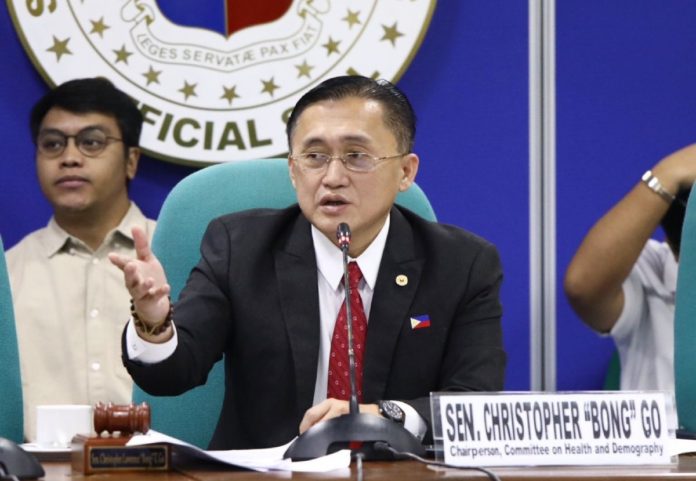
Senator Christopher “Bong” Go, Chairperson of the Senate Committee on Health, led a public hearing on Tuesday, September 10, to address the unresolved issues surrounding PhilHealth’s operations and its promises to improve healthcare services for the Filipino people.
In his opening statement, Go emphasized the importance of fulfilling the promises laid out in the implementation of the Universal Health Care (UHC) Law, which aims to provide every Filipino an access to comprehensive and quality health services. He urged PhilHealth to expand its benefits as mandated by the UHC Law, making healthcare accessible to all Filipinos.
“Nasa batas po ‘yun,” he reminded PhilHealth President Emmanuel Ledesma Jr., pointing out that the expansion of benefits was not just an option but a legal obligation. The senator insisted that PhilHealth should act swiftly to meet the expectations set by the UHC Law.
One of the most criticized policies during the hearing by Go was PhilHealth’s single-period of confinement policy, which restricts patients from being covered for the same illness within a set period, even if the condition persists or recurs.
“Halimbawa, kapag tayo po’y nagkasakit ng pneumonia, na-admit tayo, bawal na pong ma-cover ito within three months. Mapipigilan ba nating magkasakit? Pasintabi po sa kumakain. Ako mahilig akong kumain ng mga street foods, kapag nagka-diarrhea po tayo, bawal na pong i-cover muli ng PhilHealth dahil sa inyong single confinement policy,” Go explained.
He went on to list more examples of how the single-period of confinement policy fails to accommodate the unpredictable nature of illness: “Buntis, nagka-bleeding, maselan yung pagbubuntis; bawal pong i-cover muli dahil sa single confinement policy.”
The senator demanded that PhilHealth to honor its previous commitment to abolish the policy, saying, “Tuparin niyo po ang inyong pangako. You’re under oath at papa-oath ko kayo muli. Hindi po pwede rito yung promise, cross my heart,” Go warned.
Go also took the opportunity to advocate for the reduction of PhilHealth premium contributions, citing Senate Bill No. 2620, which he co-authored and co-sponsored. The bill aims to lower premium contributions of direct members to 3.25% by 2025.
“Habang nandidyan yung pondo ninyong napakalaki, dapat po’y babaan muna yung premium contribution. Dahil bawas po ito sa suweldo. Bawat piso napakahalaga po ito sa mga ordinaryong mamamayang Pilipino,” Go explained.
He urged PhilHealth to recommend to the President to reduce premiums as earlier promised, given its large reserve fund, and to consider the financial strain on ordinary Filipinos, particularly during tough economic times.
Go further urged PhilHealth to provide free medicines and services to indigent patients, underscoring the importance of making healthcare accessible to the poorest Filipinos.
After Go’s opening remarks, PhilHealth President Ledesma responded to the senator’s concerns, expressing PhilHealth’s full support for the Senate Committee on Health’s initiatives and confirmed that the agency was working to address the issues Go had raised.
Ledesma provided updates on PhilHealth’s efforts to increase case rates, sharing that the agency was in the process of reviewing a 50% increase in case rates across the board. He also announced their plan to increase the case rates for the top 10 most common diseases based on mortality and morbidity.
Go pressed Ledesma to clarify how the previous 30% case rate increase implemented in February 2024 has affected patients. Go pointed out that despite the percentage increase, actual payouts remained too low to significantly reduce out-of-pocket costs.
He emphasized that a mere percentage increase might not translate into real benefits if the base amounts covered by PhilHealth remain too low. Go urged Ledesma to provide clear examples to illustrate how the increase has improved coverage.
“Baka mamaya, PhP1,000 lang ‘yung sa iko-cover ng PhP300,000 in-increase niyo. Baka 1,000 lang, tapos in-increase niyo ulit ng 30%. PhP2,000 lang. Pwede niyo explain na mabuti. Magbigay kayo ng example,” Go said.
Ledesma acknowledged Go’s concerns and assured the senator that PhilHealth would provide a detailed explanation to clarify how the case rate increases benefit patients.
Another key issue raised during the hearing was the payment of claims to hospitals, particularly government facilities. Ledesma provided an update on the ongoing reconciliation of PhilHealth’s outstanding debt to public hospitals, explaining that the PhP15 billion figure commonly cited in media reports was likely an overestimate.
Go then stressed the importance of ensuring timely payments, not only to government hospitals but, also to private facilities, as they too are affected by PhilHealth reimbursements to sustain their operations.
“Wala naman silang pang-sweldo sa mga medical workers kung wala silang pondo. So, dapat hindi matagalan ‘yung kanilang claims. Not only sa mga government hospitals, including private hospitals din,” Go reminded Ledesma.
Go reiterated his call for PhilHealth to prioritize the needs of ordinary Filipinos in its decision-making process, especially those who are struggling to pay for healthcare services.
“Nakiusap lang ako sa iyo, President Ledesma. Sa magiging desisyon mo, parati, isipin mo lang parati ‘yung mga mahirap nating kababayan, yung mga pasyente. ‘Yun lang parati mong isipin. Hinding hindi ka magkakamali dun,” Go advised.
Throughout the hearing, Go repeatedly emphasized the importance of fulfilling promises made to the Filipino people, especially in the healthcare sector. He reminded PhilHealth that the lives of millions of Filipinos depend on their ability to access affordable and reliable healthcare services.
“Tuparin niyo po ang inyong mga pangako sa mga mahirap. Nakasalalay po dito, Mr. Ledesma, ang buhay ng bawat Pilipino. Yung mga mahirap nating kababayan. Sana maintindihan niyo po, mahirap pong maging mahirap,” Go concluded, reiterating the urgency of addressing the systemic issues within PhilHealth.







